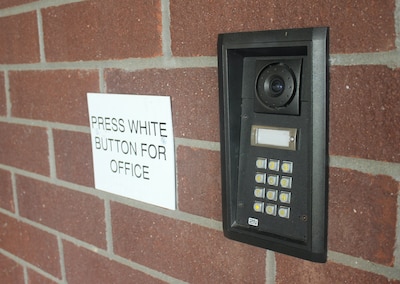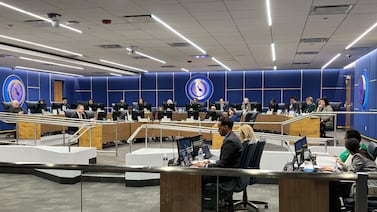Gov. Bill Lee is proposing sweeping changes to enhance school safety across Tennessee, requiring all K-12 public schools to keep their exterior doors locked, or risk losing escalating amounts of state funding with each violation.
Legislation from the Republican governor, introduced this week in several legislative committees, also mandates several new safety-related drills when students aren’t present; tweaks training requirements for armed and unarmed campus officers; and requires new security features for school buildings constructed or remodeled after this July 1.
In addition, Lee wants more top law enforcement officials on the state’s school safety team and proposes to transfer its oversight from the Department of Education to the Department of Safety, the agency responsible for homeland security and state troopers.
The governor’s proposal comes after the state fire marshal’s office identified 527 unlocked exterior doors during inspections of about 1,500 Tennessee public schools this school year, according to state officials.
Last June, Lee signed an executive order directing Tennessee school leaders and law enforcement to work together to double down on existing school safety protocols after a deadly shooting in Texas, where a gunman entered an elementary school through an unlocked door and killed 19 children and two teachers.
Lee also promised Tennesseans that state troopers and local police would conduct more unannounced security inspections of schools to make sure entrances are locked to prevent unauthorized access. More than 20,000 doors have been checked so far, state officials said.
Lee plans no new limits on firearms
Lee’s plan would continue Tennessee’s emphasis on fortifying its school campuses rather than reducing its number of firearms.
Despite having one of the nation’s highest rates of gun deaths, the state has enacted numerous laws under Lee’s leadership to loosen requirements for gun ownership. In 2021, he signed a law allowing most Tennesseans 21 and older to carry handguns without first clearing a background check, obtaining a permit, or getting trained on firearms safety.
This year, however, the governor’s administration is opposing several new bills from Republican lawmakers who want to loosen those regulations even further.
The new safety legislation fulfills a promise Lee made at his state address last month. “We’ve done a lot to make schools safer,” he said, “but I don’t want to look up months from now and think we should’ve done more.”
His proposal, outlined in a 14-page amendment, would require schools to keep all external doors locked when students are present and to limit access through one secure, primary entrance.
The legislation authorizes state and local law enforcement officers to inspect doors — and requires immediate actions to address any infractions. Written notifications describing violations must be sent within 24 hours to the school’s administrators, district leaders, the parent-teacher organization, and state officials in the departments of education and safety.

If a campus does not have a law enforcement officer on site and violates the locked door requirements two or more times in a school year, local school officials would have to post a full-time officer there within 30 days of receiving notice and undertake a corrective action plan. If they do not comply, the legislation directs Tennessee’s education commissioner to withhold 2% of its annual state funds, escalating by 2% for each subsequent violation, up to 10%.
A campus that has a full-time officer faces similar financial penalties for its district or charter organization if it violates the locked door requirements.
“To be clear, the purpose of this proposal is to help schools resolve any security flaws and ensure students and teachers are safe,” said Jade Byers, the governor’s press secretary, in a statement to Chalkbeat on Wednesday. “School funding will only be temporarily withheld while the (district) takes corrective action to resolve the issue.”
School officials want a less punitive approach
Tennessee school leaders have lauded the governor’s prioritization of school safety and, in recent years, taken advantage of millions of dollars in state grants to upgrade building security and hire law enforcement for their campuses. For instance, a grant program championed by the governor in 2019 placed more than 200 SROs in schools.
But they say that more money is needed to hire more officers — and that the governor’s proposal doesn’t address their staffing challenges.
According to the state’s most recent school safety report, for the 2021-22 school year, fewer than 1,300 of the state’s 1,800-plus schools had a trained school resource officer, or SRO, on site.
“The attention and focus on keeping our schools safe is appreciated, but financial penalties will not help add the security measures needed,” said Dale Lynch, executive director of the state superintendents organization, which has lobbied for enough funding so every Tennessee school has an SRO.
Money isn’t the only challenge that districts face, according to Mike Winstead, director of Maryville City Schools, near Knoxville.
“One of the punishments under this bill is that you might have to hire an SRO within 30 days, but that’s easier said than done,” he said. “Many districts across our state have tried to secure SROs from their local police departments, but there’s a shortage of personnel. Police are losing a lot of officers to the federal government, where they can triple their salary.”
Lee also proposes to add annual drills — without students present — for emergency bus safety, and also to prepare school staff and law enforcement agencies on what to expect in an emergency situation at a school.
State law already requires schools to conduct periodic fire drills and annual armed-intruder drills, plus three additional annual drills to prepare for potential emergencies such as an earthquake or tornado.
Altogether, the legislation serves as “an additional meaningful step to secure schools and further enhance school safety,” said Byers, the governor’s spokeswoman.
But striking the right balance between school safety and educational climate is also a concern, says Winstead, a 2018 finalist for national superintendent of the year.
“We want our schools to be friendly and welcoming to students and their families,” said Winstead, “and we don’t want to make our kids feel like they’re going to school in a prison.”
He says collaborative working relationships between school officials and law enforcement are more productive than punitive ones. He’d also like to see more state investments to support student mental health beyond the governor’s $250 million student mental health trust fund, established in 2021 as an endowment to pay for future services.
“Drills are important, SROs are important,” said Winstead, “but the most important thing we can do is foster strong relationships between students and adults.”
You can track the bill’s progress on the legislature’s website.
Marta Aldrich is a senior correspondent and covers the statehouse for Chalkbeat Tennessee. Contact her at maldrich@chalkbeat.org.






